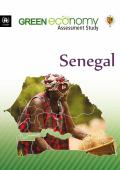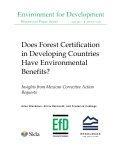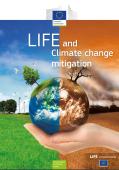

This discussion paper hypothesizes that these findings were at least partly driven by the tendency of FSC certification to attract already- sustainably managed forests and by the governance challenges of community forestry in developing countries. One implication is that policymakers using FSC certification to generate environmental benefits may want to target forests with less-than-stellar management—particularly in the case of reduced emissions from deforestation and degradation (REDD) initiatives that emphasize improvement beyond business-as-usual—and to build the community and legal institutions needed for sustainable forestry.

Long before the Kyoto Protocol was signed, a number of companies and NGOs started to invest voluntarily in forest carbon offsets thereby creating a voluntary carbon market. Within the climate movement, the assessment of forest carbon offsets for mitigating climate change is one of the major ‘battle lines.’ A large group of critical civil-society actors categorically rejects these instruments. This group sets the formation of carbon markets in the wider context of finance-driven neoliberalism. Rather established international NGOs, such as Conservation International actively support forest carbon offsets as additional incentives for forest conservation. In 2005 international NGOs, companies and academic institutions developed the Climate, Community and Biodiversity Standards (CCB). CCB standards aim to guarantee that certified projects mitigate climate change and contribute to local development and habitat conservation. Drawing on two forest carbon offsets certified according to the CCB standards this contribution analyzes the role of civil society actors within forest carbon offset governance and seeks to evaluate the in- and output legitimacy of the CCB standards.
In recent years there has been increasing support for establishing successful models of REDD+ and low emissions development (LED) efforts at a jurisdictional scale. Jurisdictional efforts were designed to overcome the shortcomings of project-based approaches by working across land-use types and with multiple stakeholders to create models for national implementation. This study analyzes some of the most advanced REDD+/LED initiatives worldwide - including a critical look at the success and challenges to date - to understand what is needed to succeed going forward. Eight diverse jurisdictions were studied: Acre, Brazil; Berau, Indonesia; Ghana’s cocoa ecoregion; Mai Ndombe, Democratic Republic of the Congo (DRC); San Martín, Peru; São Félix do Xingu, Brazil; the Terai Arc, Nepal; and the Yucatan Peninsula, Mexico.
